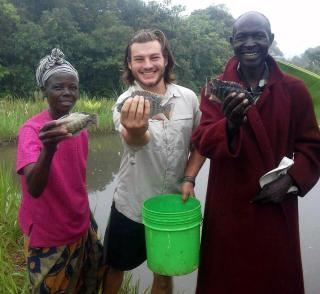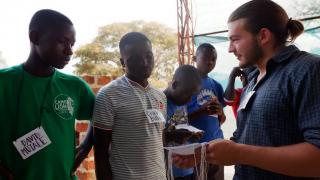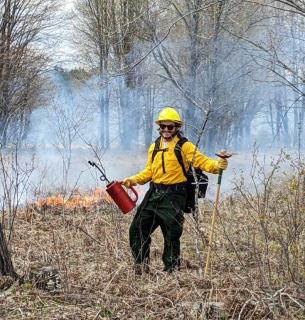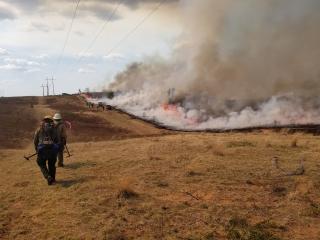Returned Peace Corps volunteer finds a new purpose working with Job Corps
NORTH CAROLINA – Eight thousand miles separate Zambia from Franklin, North Carolina, but Joshua Brandt has found that the valuable cultural lessons he absorbed there as a Peace Corps volunteer are proving useful in his position as a social services assistant supervising youth at Lyndon B. Johnson Job Corps. Brandt taught aquaculture to Zambian farmers and worked as a provincial volunteer leader coordinating 45 Peace Corps volunteers across 19,524 square miles in Luapula Province from February 11, 2017 through March 20, 2020.
Brandt returned home in March 2020 after Peace Corps recalled its 7,000 volunteers due to the COVID-19 pandemic. He worked odd jobs until he stumbled across an outreach notice for Job Corps. Brandt, who earned a degree in Environmental Science and Geography from Carthage College, felt his educational background and the skills he honed as a volunteer aligned well with the duties of an SSA.
“During my time in Zambia I had discovered I have a passion for community building. I learned a lot from my Zambian community and from my work helping shape the community of volunteers working in the province,” says Brandt.” I saw the Job Corps posting while looking at other jobs within the Forest Service. The more I read, the more it sounded like a great fit.”
Brandt’s first day at LBJ, where he works as a dorm supervisor on the night shift, was January 17, 2021, before the country began to reopen. “The interactions I have had with students have been eye opening,” says Brandt. “I see a lot of potential for these young men and women as the pandemic restrictions begin to lighten and the residential department staff get dialed in.”

Zambian cultural traditions that Brandt initially had difficulty with as a volunteer are now ones that he wants to share with other Americans. He found the country’s divergent concept of time, as compared to Americans, a particular challenge. Americans assign a high moral value on punctuality. Brandt had to learn that Zambians moved at a different pace and was forced to alter his expectations surrounding schedules and meeting times.
“Zambian culture places more emphasis on personal interactions rather than strict time management. In meetings, I could not just get down to business,” say’s Brandt. “I was expected to introduce everyone, ask about everyone’s day and lay the social groundwork for the meeting before I could tackle the business purpose for the meeting. There are pieces and aspects of Zambian culture that I learned while serving that I want to bring back to the U.S.”
Cultural differences melted away during special moments he experienced in his adopted community. One particular memory stands out. Accompanied by his neighbor and close friend Brian Mukonde, Jr., he participated in Camp TREE, a week-long environmental leadership camp, in one Zambia’s National Parks that coincided with the annual fruit bat migration.

“Zambians and Americans are at opposite ends of the spectrum on a number of cultural aspects and I often found it challenging to try to get into the same mindset as some of my Zambian peers,” says Brandt. “But as we looked up at all of these millions of bats flapping by in the hot dusk sky, I saw the same quiet amazement in Brian and the students as I was feeling. We grew up on different ends of the planet with wildly different lived experiences and worldviews, but we could still share this very human feeling of awe. It was a moment I will never forget.”
These lessons in nuance and flexibility have proved useful in managing his young clientele and with fellow LBJ residential staff, many of whom also are newly hired. “A big part of the work so far has been balancing some of the fresh ideas with the proven procedures from the past,” says Brandt. “It has been a lot of work learning how we can all work effectively together.”

Wildland firefighting is central to Forest Service culture and, after arriving at LBJ, Brandt was eager to earn his red card. His first assignment was on a prescribed burn module on the Hiawatha and the Chequamegon-Nicolet National Forests. “In my nine-member module, five of us had a direct connection to Job Corps and one member was Job Corps graduate,” says Brandt. “We burned approximately 95 acres on the Hiawatha National Forest Dutch Mill Unit and approximately 1,400 acres on the Chequamegon-Nicolet National Forest Washburn Unit.”
The modules Crew Boss Trainee Adam Henry handed Brandt a drip torch and instructed him to start a fire in order to teach Brandt about fire behavior. He wanted him to observe how the fire changed as it spread across different topographies, fuel types and the impact of the wind.
“At one point, the fire was backing into the pines exactly the way we wanted and then the wind shifted,” says Brandt. “I was amazed at how quickly a slight shift in the wind made the fire, which was slowly backing through a narrow stand of pines, stand up and even start climbing the pines. I certainly gained a new appreciation for how dynamic fire behavior can be and a great respect for the men and women who need to act decisively and efficiently to manage controlled burns like this one and especially on wildfires.”
“A difference between a career and a purpose is about 8,000 miles,” is a well-known Peace Corps slogan. Joshua Brandt found his purpose on both ends of the 8,000 miles he traveled between Zambia and North Carolina. He misses his Zambian friends and co-workers, but Forest Service Job Corps has allowed him to embark on a new journey. “I am still working out a lot of the details of where I want to go,” says Brandt. “For now, I am very excited to continue working at LBJ. I think there will be a lot of exciting opportunities as we grow with new students and new staff.”


